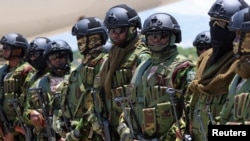The United States believes the United Nations should be improving its peacekeeping models, said Ambassador Robert Wood, U.S. Alternative Representative for Special Political Affairs.
Peacekeeping has proven effective at protecting civilians, supporting peace agreements, bolstering the capacities of responsible host governments, and preventing the recurrence of conflict, said Ambassador Wood:
“We continue to believe in this tool and will continue to support current and new multidimensional missions, as appropriate. At the same time, we must also explore other models that may be needed in different scenarios. In some cases, a more targeted mandate, focusing on a more specific and limited set of objectives, may be better suited to the context and more successful at securing broad support from the Council.”
In some cases, it may be more effective for the African Union or a regional organization to lead the response. Newly adopted Security Council Resolution 2719 provides “a mechanism for the UN to support AU peace support operations authorized by the Council,” said Ambassador Wood.
There are several key factors that are important to the success and the integrity of UN peacekeeping missions, old and new, said Ambassador Wood:
“First, we must remain committed to the core principles of peacekeeping, including impartiality. UN missions do not exist as service providers to host governments – they are impartial actors whose mandate is to address threats to international peace and security regardless of the source of that threat.”
“Second, missions must operate free of obstruction in order to effectively implement their mandates and to ensure the safety and security of their own personnel,” stressed Ambassador Wood:
“When peacekeepers encounter obstruction or access restrictions, this Council has a duty to act swiftly to support the mission and ensure its free operation in accordance with its status-of-forces agreement.”
Lastly, peacekeeping missions exist to create a safer and more secure environment for civilians whose lives are torn apart by conflict, said Ambassador Wood:
“Whether in current models or new models, protecting civilians and creating a more peaceful and secure environment for them should be at the core of peacekeeping. Relatedly, peacekeeping operations create the space for durable political solutions, which requires genuine inclusion of women, youth, and other marginalized groups.”
UN peacekeeping remains an invaluable tool to prevent and mitigate conflicts.






